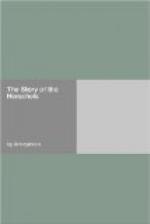Miss Herschel’s claims to the gratitude of men of science, and to the admiration of all who can appreciate the beauty of self-sacrifice, did not end here. She was herself an astronomer, and an original observer. At times her brother was enabled to dispense with her attendance. You would suppose that such leisure nights she would gladly give up to rest. Not she. Her brother might, at some unforeseen moment, require her aid, and consequently she preferred to be close at hand. A seven-foot telescope planted on the lawn helped to while away the hours of waiting; and it was to the occupation of these hours that science owed the discovery of the comet of 1786, of the comet of 1788, of the comet of 1791, of the comet of 1793, and of that of 1795, now connected with the name of Encke. Many, also, of the nebulae contained in Sir William Herschel’s catalogues were detected by her keen and accurate gaze during these nights of lonely observation. Indeed, as South remarked, when looking at the joint-labours of these two enthusiasts, we scarcely know whether the warmer praise should be given to the intellectual might of the brother or the ardent industry of the sister.
In 1797, continued her eulogist, she presented to the Royal Society a catalogue of 560 stars, taken from Flamsteed’s observations, the exact positions of which had not been previously defined.
Soon after the death of him to whom she had given up so much of her life, her best energies, and her ripest faculties, she returned to Hanover,—unwilling, however, to relinquish the astronomical researches which had been so pure and permanent a source of pleasure. She undertook and completed the laborious “reduction” or registration of the places of 2500 nebulae, down to the 1st of January 1800; thus presenting in one view the results of all the observations Sir William Herschel had made upon those wonderful bodies, and triumphantly bringing to a close half a century of scientific toil.
* * * * *
We return to Miss Herschel’s biography, in order to gather up a few particulars of her last years, and to exhibit some of the tenderer features of her character.
On the occasion of her nephew’s marriage, in 1829, she wrote to him in the following terms:—
“MY DEAREST NEPHEW,—I have spent four days in vain endeavours to gain composure enough to give you an idea of the joyful sensation your letter of February 5th has caused me. But I can at this present moment find no words which would better express my happiness than those which escaped in exclamation from my lips, according to Simeon (see St. Luke ii. 29), ’Lord, now lettest thou thy servant depart in peace.’
“I have now some hopes of passing the few remainder of my days in as much comfort as the separation from the land where I spent the greatest portion of my life, and from all those which are most dear to me, can admit. For,




